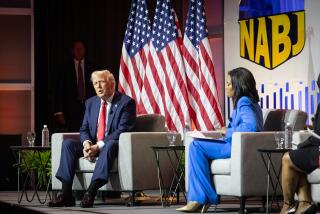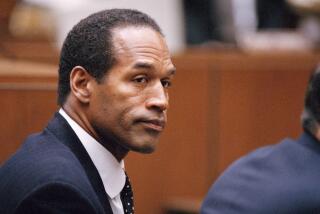Reid flap shows the need for a conversation on race
- Share via
The furor over Sen. Harry Reid’s remarks about President Obama’s race, reported by The Times in several articles, has gone way overboard. His remarks, however -- that Obama is “light-skinned” and speaks with “no Negro dialect, unless he wanted to have one” -- may yet prove useful in sparking a badly needed, frank conversation about race in America. Indeed, we can never understand what Reid meant -- and our reaction -- unless we have this conversation.
Though I accept Reid’s apology and take the president at his word that this is a nonissue, we must be honest with ourselves about the context of what Reid said. It is true in America that our white brothers and sisters have a different level of comfort with people of African descent, and that their personal comfort impacts and influences opportunities in employment, grading in schools, civic engagement -- and especially voting. Additionally, many African Americans learn the art of “code switching,” where our outward display of attitudes and behaviors is sometimes geared toward what we believe will help our white counterparts feel more comfortable, even as we act and talk differently when the company is exclusively or predominantly black. This has much to do with how we look, dress and speak.
In my own research on racial identity development, I have asserted that the central issue for black people on the question of identity is how one maintains a sense of cultural integrity in a world that does not support and affirm our humanity as a person of African descent. Lest one thinks that this question has been raised only recently, I am reminded of a line from an old folk song sung by black slaves, as reported by social scientist Russell Ames in 1950: “Got one mind for white folks to see, ‘nother for what I know is me.”
Even Obama during his campaign had to walk a fine line of being “black enough” for African Americans, who early on questioned his sense of cultural identity, and not “so black” that he would alienate white, Latino, Asian and other communities with whom he needed to build a coalition to have a chance at winning. To act as if this somehow wasn’t the case is to deny the reality of racial dynamics in America.
While racial politics in the U.S. have indeed changed over the past half a century, they haven’t change enough to allow African Americans to let down their guard. Americans simply cannot suddenly abandon their long-held biases about dark- versus-light-skinned black folks or those who talk in standard English versus what some perceive as urban or “ghetto” slang.
As tasteless as some believe Reid’s remarks were, there is some truth to the fact that white Americans are sometimes more comfortable with persons of African descent whose facial features, style of conversation and degree of articulation most reflect their own. And lest we reveal too many secrets in the black community, there are a lot of African people whose exposure to racism and oppression (whether in their own lives or via transmission through the generations) has influenced their psyches in such a way that we harbor the same biases about ourselves that our white counterparts hold about many African Americans. It is manifested in the choices we make about who is an appropriate mate, what neighborhoods are appropriate to live in and even the people we choose to make our peers.
Perhaps Reid’s remarks can serve as an invitation for us to continue this conversation about race and move us closer to true racial understanding.
Thomas A. Parham, a psychologist and author, is the assistant vice chancellor for counseling and health services and an adjunct faculty member at UC Irvine.
More to Read
A cure for the common opinion
Get thought-provoking perspectives with our weekly newsletter.
You may occasionally receive promotional content from the Los Angeles Times.










